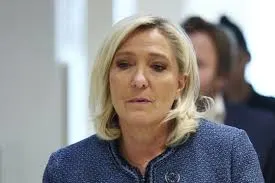Discover the rise of Marine Le Pen, the French nationalist leader. Learn about her political journey, views, and impact on France’s future.
Marine Le Pen is one of the most prominent figures in contemporary French politics. As the leader of the National Rally (Rassemblement National, formerly known as Front National), she has become a symbol of nationalism and right-wing populism in France. With a growing following, Le Pen’s influence on French politics continues to evolve, attracting both fervent supporters and fierce critics.
In this article, we will delve into her political journey, ideology, controversies, and how she has shaped the French political landscape.
Early Life and Political Roots
Born in 1968 in Neuilly-sur-Seine, France, Marine Le Pen is the daughter of Jean-Marie Le Pen, the founder of the far-right political party Front National. Growing up in a politically charged environment, she was exposed to the ideological battles that defined her father’s career. Her father’s hardline stances on immigration, the European Union, and national sovereignty laid the foundation for Marine’s own political trajectory.
Marine initially studied law and worked as a lawyer before fully committing to her political career. She joined Front National in the 1980s, working her way up through the ranks. By 2011, she became the party leader, taking over from her father and modernizing the party’s image in an attempt to appeal to a broader base of voters.

Political Rise and Nationalism
Marine Le Pen’s political ideology is centered around French nationalism, opposition to the European Union, and a hardline stance on immigration. She advocates for a strong, independent France that prioritizes national identity and sovereignty. Unlike her father, who was often associated with extreme rhetoric, Marine sought to soften the party’s image and reach out to middle-class voters disillusioned with traditional French political elites.
Her efforts were successful, as National Rally steadily gained support in national elections. In the 2017 French Presidential Election, Marine Le Pen advanced to the second round, where she faced off against Emmanuel Macron, ultimately losing but securing a significant share of the vote. This marked a turning point for the National Rally, signaling the rise of right-wing populism in France.
Key Policies and Positions
Marine Le Pen’s platform is built around several core issues:
- Immigration: Le Pen advocates for stricter immigration controls, including a ban on non-EU immigration and a reduction in the number of asylum seekers allowed in France.
- European Union: She has been an outspoken critic of the European Union, proposing a Frexit (a French exit from the EU) or at least a referendum to determine France’s future in the union.
- National Security: Le Pen supports enhanced national security measures, including increasing police presence and combatting Islamic extremism within France.
- Economic Protectionism: She promotes protectionist economic policies, including limiting free trade agreements that she believes undermine France’s economy.
Her positions have resonated with a segment of the French electorate that feels left behind by globalization, mass immigration, and the EU’s influence over French sovereignty.
Controversies and Criticism
Marine Le Pen’s political career has not been without controversy. Critics have accused her and the National Rally of promoting xenophobia and Islamophobia. Some of her policies and rhetoric have been viewed as divisive, particularly her stance on immigration and the Islamic faith. Additionally, her party’s historical ties to anti-Semitism have been a constant source of scrutiny, though she has worked to distance herself from those elements since taking over the party.
Le Pen’s critics argue that her policies threaten France’s social cohesion, while supporters see her as a defender of French identity in the face of globalization.

Impact on French Politics
Despite the controversies, Marine Le Pen has had a lasting impact on French politics. Her rise to prominence has shifted the political discourse in France to the right, as mainstream parties have been forced to address the issues she champions. Immigration, national identity, and the EU have become central themes in French elections, with Le Pen playing a key role in driving these debates.
While her path to the presidency remains uncertain, Marine Le Pen continues to be a dominant force in French politics, influencing public opinion and shaping the future direction of the country.
Conclusion
Marine Le Pen’s political career is a reflection of the growing wave of right-wing populism that has swept across Europe and the world in recent years. Whether one agrees or disagrees with her policies, there’s no denying her significant impact on French politics. As the National Rally continues to gain momentum, Le Pen’s influence will likely play a key role in shaping France’s political future for years to come.





